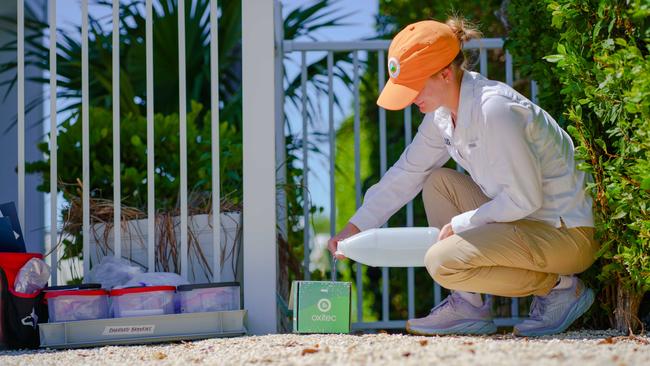Oxitec’s GM mosquito masterplan details revealed for Qld
A biotechnology firm is seeking approval to release genetically modified mosquitoes en masse in Queensland in a bid to curb a number of deadly viruses. Here’s how it would work.

Pets and Wildlife
Don't miss out on the headlines from Pets and Wildlife. Followed categories will be added to My News.
A biotechnology firm has been seeking approval from the federal government to release genetically modified mosquitoes in Queensland, but its controversial plan faces community backlash.
Oxitec Australia, a collaboration between Australia’s national science agency CSIRO and British company Oxitec, applied to the Office of the Gene Technology Regulator for permission to commercially release a mosquito strain with a self-limiting gene.
The project aimed to reduce the population of yellow fever-carrying mosquitoes in Queensland, also known as aedes aegypti academically, to prevent mosquito-borne disease outbreak.
The species, which originated in Africa, is now found in more than 120 countries, including northern and central Queensland.
Their females bite for blood and transmit viruses such as dengue, zika, chikungunya and yellow fever.
In the licence application, the company stated it will bring overseas-made genetically modified eggs into Australia and prepare them in mosquito rearing boxes in a local facility to release them into the environment.
The boxes will be available for sale to pest control professionals, businesses and the general public.
The modified mosquitoes are males only and will mate with their wild counterparts to deliver a certain protein that causes their female offspring to die during the larval stages.
While their male larvae, which do not bite humans or animals, will survive and develop into adulthood.

The cycle then continues, but Oxitec claimed in its application that the wild mosquito population “would return to its initial state” if the releases stop.
An Oxitec spokeswoman told The Courier-Mail that the introduced genes cannot persist in the environment for the long term.
“The aedes aegypti mosquito is the primary vector of life-threatening illnesses including dengue,” she said.
“Friendly aedes aegypti would specifically target the invasive aedes aegypti, protecting communities against this dangerous mosquito, without harming off-target species.”
Government data showed 349 dengue cases, one of zika and 12 chikungunya conditions were reported statewide last year.
The spokeswoman also said the produced mosquitoes are non-toxic to predators.
“Friendly mosquitoes are species-specific – and are therefore harmless to non-target species such as butterflies and bees,” she said.
“More than a billion friendly mosquitoes have been released, with no reported harm to people or the environment and our solution has been piloted in South, Central and North America.”
The application is under evaluation for a science-based risk analysis and will accept public comment from March.
The edge-cutting technology sparked concerns among Queenslanders, including from Clarendon resident Gary Duffy.
Mr Duffy said Australian insects such as dragonflies consume a huge number of mosquitoes each day.
“You’re totally changing their diets … It might be all right in a lab where you don’t take into consideration these factors,” he said.
“I’d like an opportunity for the people to have this environmental discussion for our future of everything that is living and growing on the planet.”
The 68-year-old man launched a petition, which was pending approval at the time of publication, to the federal parliament to list the release or production of genetically modified insects as a criminal offence.


